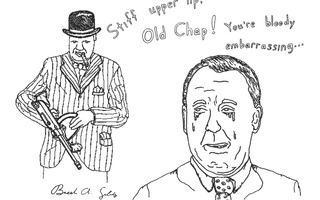It’s a brisk day in March 2008, and I’m going door-to-door in Pennsylvania clamoring for prospective voters to support Senator Barack Obama. I have done extensive research, know the nitty-gritty of each candidate’s policies, and relentlessly—perhaps even petulantly—insist that the people I encounter come aboard the campaign.
The thing is: I’m 12-years-old, have a voice the pitch of Mariah Carey’s 5th octave, and am being followed by my mother, who, I insist to the Pennsylvanians, is only there as my means of transportation.
It isn’t the campaign slogans that lure me in. It isn’t Obama’s foreign policy or plans for climate change either. No, my almost primal support for the Senator is not based on concrete policy; it’s centered around the idea that Obama genuinely cares about the well-being of all Americans—that he became a politician to make the world a better place.
I root for Obama like I root for the Knicks, and just as my mood fluctuates with Knicks wins and losses, I become emotionally attached to every piece of legislation the President advocates for during his first term in office. When he wins legislative battles, I win. When he loses, I’m devastated.
Fast-forward a few years.
President Obama’s second term is almost over. I’m 19-years-old now, a sophomore in college. In the last year, I’ve stopped writing about politics, fallen slightly out of touch with the day’s most contentious issues, and haven’t even officially registered to vote. “Yes, we can” has become “Sure, I might as well.”
My 12-year-old self would be wildly confused.
It’s hard to pinpoint an exact moment when my mindset changed. But, as Hemingway might say, “gradually, then suddenly,” I became apathetic to the whole politics thing. Sure, I’ve had moments of genuine pride in the political system—when the President signed the Affordable Care Act, repealed “Don’t Ask, Don’t Tell,” ended the Iraq War, etc.—but now it comes from a much more cerebral place.
Change is slow. Intransigence is real. Legislation has earmarks. It’s harder to look at politicians with blind optimism at 19 than it is at 12.
It’s not like I don’t discuss the hot button issues at the dinner table. And it’s not like Obama’s speech on race in Selma last year didn’t give me goose bumps. But at some point, I decided that politics were inherently corrupt—that even positive legislative developments only happen for nefarious, self-aggrandizing reasons. I went from believing in The West Wing’s version of government to House of Cards’ and I definitely wasn’t going to knock on doors in Pennsylvania this fall.
But then I saw John Boehner step down as Speaker of the House and my whole worldview spun on its axis: I started believing in politics again.
Now, if you’d have told me in 2010 that John “Hell No You Can’t!” Boehner would reinvigorate my hope in the political system, I would have laughed in your face. Boehner was the symbol for the Republican Party’s resurgence—an orange villain less tasteful than Snooki and scarier than any jack-o’-lantern.
But watching Boehner’s press conference this week—in which he sacrificed his personal political standing in an attempt to salvage his party—gave me the same warm feelings I got in 2008. Because regardless of whether or not I share his point of view, I recognize that Boehner has spent the past 25 years serving our country the way he thinks is best—“[fighting for] smaller, less costly, more accountable government.” And however misguided his policies may be, I admire his relentless dedication to making this country a better place.
Some will say that pressure was already mounting for him to resign, and it was probably inevitable that he would leave office soon one way or another. But it doesn’t matter how we got here: This week, Boehner put political ideology aside, and made a decision that helped save the very government he’s fought for so long to shrink.
Of course, this doesn’t give me the same kind of hope I had at 12-years-old. And it shouldn’t. I know now that sweeping change is rare, and politics, more often than not, is about creating incremental progress, not radical reform.
But Boehner reminded me that while many politicians may be craven and opportunistic—and the political system might not be all that I thought it was in 2008—few things beat politics when it works. And even if I might just be setting myself up for disappointment, I’m ready to become emotionally invested again.
After all, even after a lifetime of losing, I still tell myself this will be the Knicks’ year.
Samuel H. Koppelman ’18, a Crimson editorial executive, lives in Leverett House.
Read more in Opinion
Letter to the EditorRecommended Articles
-
The Delusion of HopeThe phrase “audacity of hope”—the title of Barack Obama’s best-selling book—comes, as NBC’s Tim Russert reminded viewers of Tuesday’s Democratic
-
Don’t Politicize DiplomacyNational security issues are far too important to be subject to the childish bickering that has become the norm in today’s politics.
-
The Wrong TacticThe smooth and effective functioning of this nation’s government requires that these disagreements end not in dangerous threats and ultimatums, but instead in compromise, as elusive as that may be.
-
 Teardrops on My Gavel
Teardrops on My Gavel -
Jim Jordan’s Butchered InsurgencyIn this race for Speaker, the Freedom Caucus has simply inserted itself in the vacuum left by Boehner instead of reforming the undemocratic power structure altogether.













